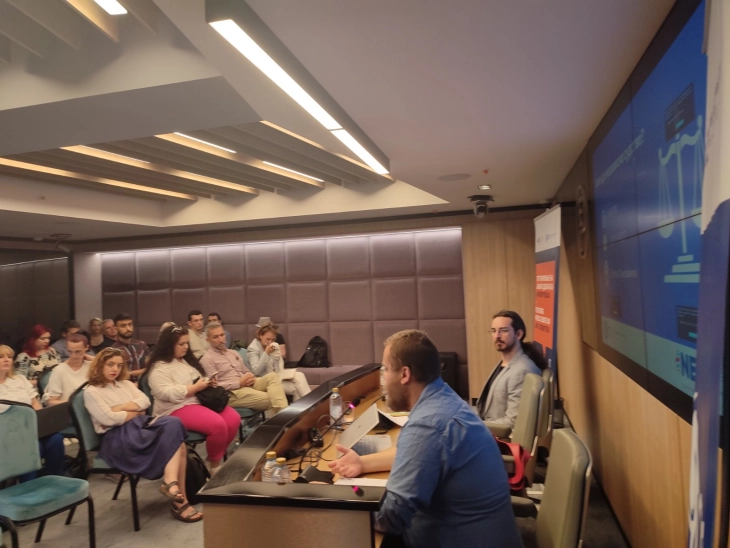IDSCS panel: Judges should publicly oppose corruption and influence
- Civil society sector representatives participated on Tuesday in a panel discussion on ways to achieve independence in the judiciary, expressing views that the problems in the judiciary in terms of independence and professionalism are not recent, but inherited since the country's independence and the establishment of the new judicial system.
- Post By Nevenka Nikolik
- 17:08, 4 July, 2023

Skopje, 4 July 2023 (MIA) - Civil society sector representatives participated on Tuesday in a panel discussion on ways to achieve independence in the judiciary, expressing views that the problems in the judiciary in terms of independence and professionalism are not recent, but inherited since the country's independence and the establishment of the new judicial system.
According to the participants in the panel organized by the Institute for Democracy Societas Civilis - Skopje (IDSCS), latest developments in the Judicial Council show that the peak of lawlessness has been reached, and what's needed are long-term solutions, using the example of judges with integrity who have opposed corruption and influence.
Darko Avramovski from the Coalition All For Fair Trials said due to the absence of any activity that would contribute to long-term and sustainable solutions to improve the situation in the judiciary, problems are in fact only accumulating, and it is very difficult to untangle the situation without collateral damage in the process. According to him, an example of that are the developments in the Judicial Council.

"This means that the situation is extremely serious, and we have to find a way to start solving things in the long-term, instead of thinking that this is a situation that we will be able to resolve in a few months or in a few years. Twenty years of problems cannot be overcome in less than probably the same period. However, to do that it is necessary to do good research, good planning, to open public debates, to involve all stakeholders, to include those judges who would be encouraged to publicly oppose corruption and influence in their profession," said Avramovski.
In response to a reporter's question on whether vetting of judges and prosecutors is necessary, Avramovski said it is a complex issue, which he believes is being opened as a subject of political manipulation and populism in order to raise it in the public, because, he noted, even with the current mechanisms there is a possibility of vetting, but with a truly independent and professional Judicial Council.

Executive Director of the Helsinki Committee for Human Rights, Uranija Pirovska, noted that what has been happening in the judiciary for 30 years is now reaching its peak, underlining that no government in the country has managed to refrain from influencing the judicial system, which has created a strong matrix that leaves no room for the judges themselves to believe in the system of which they themselves are a part. She also pointed to the developments in the Judicial Council.
"OSCE research shows that judges themselves do not initiate legal proceedings when they are dissatisfied with elections or promotions, they are afraid to speak up about what is happening in the judiciary, and they are offended when those of us who follow the situation come out with the conclusion that the judiciary is corrupt, that there are judges elected along party lines. I would tell them not to be offended, but to come out and use the legal means available to them. It is nebulous that the judges are silent," said Pirovska.
She stressed that ultimately, the most important thing is the responsibility and professionalism of the stakeholders in the judiciary who have to implement the law. Pirovska told reporters that she does not believe in the influence of the international factor in terms of improving the situation in the judiciary, considering the hundreds of millions of euros invested, pointing to the latest developments in the Judicial Council as an example.

Good Governance Program Coordinator at the Institute for Democracy Societas Civilis - Skopje (IDSCS), Misha Popovikj, said the purpose of today's event is to continue the debate on how to achieve an independent judiciary, given that there is no possibility of progress in the judiciary "if you are not a member of a political party or do not serve political or business interests".
According to him, what really works are the external mechanisms of judicial control, including monitoring by the civil society sector and writings in the media about crime and corruption, while one of the questions that needs to be answered is how to encourage judges to oppose corruption.
"The OSCE corruption risk assessments of the judiciary from 2009 and 2022 show that the system of influence has adjusted, i.e. while in 2009 it is noted that the influence on the impartial work of judges was equally influenced by the Judicial Council, their colleagues, politicians... on certain cases, now in 2022 the results show two levels of control and the influences that judges receive from their colleagues and their superiors are much more pronounced (over 40 percent of judges). That system of influence has adjusted to look a little more veiled, and we see that structure of control. Probably one of the solutions is how to overcome that pressure in everyday work," Popovikj said, pointing out that the solution is to encourage judges with integrity to use current legal mechanisms to bring to justice and expel from the system colleagues who act unprofessionally.
The event is organized as part of the project "Fostering Public Debate on Anti-Corruption" which is aimed to support the reform process in North Macedonia through strengthening the rule of law reform agenda. In order to achieve this goal, the project envisages establishing cooperation and consultation processes with all relevant stakeholders in the fight against corruption. The project is supported by the National Endowment for Democracy (NED), says IDSCS.
Photo: MIA







